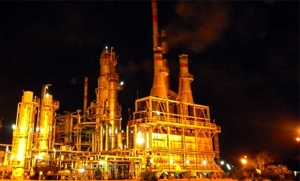Sri Lanka to revamp, double refinery capacity

(Reuters) Sri Lanka plans to upgrade its sole oil refinery and double its capacity to boost output and to reduce the cost of importing refined fuels, the country's Petroleum Resources Minister Chandima Weerakkody said on Monday.
The island nation is home to a single oil refinery, Ceylon Petroleum Corp.'s (CPC) decades-old 50 Mbpd plant. It was originally configured to run on Iranian crude, and Sri Lanka had to import more refined oil products after US sanctions caused it to stop crude imports from Iran.
CPC replaced the Iranian crude with supply from Malaysia and Abu Dhabi, but the efficiency of processing the grades was low.
"The proposal is to improve the performance by upgrading the existing refinery and add another 50 Mbpd," Weerakkody told Reuters in an interview.
The revamped refinery will use a hydrocracker to expand its production of more valuable fuels such as gasoline, kerosene, jet fuel and diesel oil, he said.
"All this is estimated at $2.2 B. But my feeling is this can be done less than that, somewhere around $1.6-1.7 B."
Though some countries including China, the US and India have expressed interest to build new refineries in the eastern and southern port cities of Trincomalee and Hambantota, there has been no final decision yet, he said.
The government said the ministry of development strategies and international trade is discussing investment proposals in Hambantota with foreign investors, including a second oil refinery.
Sri Lanka in 2011 refined more than 60% of the total fuel consumed in the country, but now this has come down to around 35%, petroleum ministry officials said.
Weerakkody said the country could save around $400 M annually through higher crude imports.
Sri Lanka's oil import bill plummeted 41% in 2015 versus the prior year to $2.7 B mainly due to the fall in world oil prices, but also because of higher imports of refined oil.
Weerakkody said the country is in discussion with Iran to resume crude imports, but has not done so because of a ban on bank transactions with Iran.
Reporting by Shihar Aneez and Ranga Sirilal; Editing by Christian Schmollinger






Comments